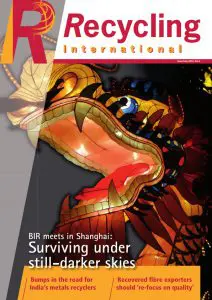29June/July 2013
Recycling thrust
As an example of how a government can boost
its recycling industry, Nathani cited China. ‘In
that country, the government has realised the
importance of recyclable material as an impor-
tant raw material and it has given a thrust to the
recycling industry,’ he stated. ‘In its current Five-
Year Plan, the government encourages all cities
in China to provide Recycling Zones and gives
full assistance. It provides easy bank finance and
subsidies for metal recycling companies.’
According to Nathani, the Indian authorities
should appoint a single ministry to handle all
recycling issues, including the framing of leg-
islation to boost India’s metals recycling indus-
try. ‘In addition, India should promote the
setting-up of “Alang-type” shipbreaking yards
along the country’s coastlines and form spe-
cially-designated zones or areas for metals recy-
cling on the outskirts of each major city.’
Nathani also stressed the utmost importance of
promoting free trade of scrap and of putting an
end to the restrictions placed on imports of metal
scrap. ‘India should abolish customs duty and
special additional duties on imports of all grades
of both ferrous and non-ferrous scrap, whether
imported by traders or actual users,’ he insisted,
Shipping problems
MRAI vice president Sanjay Mehta of MTC
Business addressed issues faced by the Indian
metals recycling industry in relation to ship-
ping, logistics and customs trade practices.
As regards challenges when dealing with ship-
ping lines, Mehta pointed to the lack of ade-
quate online services, such as online invoices,
accepting online payments and the issuing of
online delivery orders. ‘There is also often a
mismatch in the working hours and holidays
of the shipping lines and local business opera-
tions,’ he said. ‘In addition, the shipping lines
often do not grant a detention free period, even
when this is mentioned on the bill of lading.’
Other problems confronting India’s metals
recyclers include: the refusal to issue a delivery
order even after the surrender of the original
bill of lading; the shunting of containers; the
fact that examination of cargo under customs
supervision is not allowed prior to issuance of
the delivery order; the very high, and some-
By far the most important source of scrap for India’s steel industry is the shipbreaking industry, which accounts for some 11 million tonnes.
MRAI urges India to abolish customs duties on all grades of ferrous
and non-ferrous scrap.
Metals sorters north of Mumbai.
RI-5_MRAI.indd 29 17-06-13 15:16




